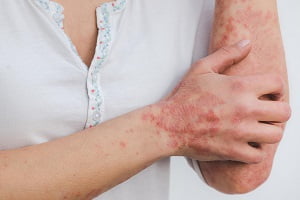Pemphigus Disease – Types, Symptoms, and Causes: An Overview
- Updated on: Jul 5, 2024
- 4 min Read
- Published on Jul 15, 2022

Pemphigus is a set of autoimmune skin disorders that result in sores, blisters, or bumps on your skin that is filled with fluid. Your mucous membranes, which are the sensitive linings of your eyes, nose, mouth, throat, and genitalia, can also develop these blisters. The sores that result from the blisters’ easy opening and softness are painful. Without treatment, they pose a risk of infection and can spread to several parts of your body.Pemphigus can occasionally be mistaken for other autoimmune skin disorders that cause blistering, including bullous pemphigoid, lupus erythematosus, and Hailey-Hailey syndrome.
How Common Is Pemphigus?
If you have specific risk factors, pemphigus is more likely to affect you. These consist of:
Ethnic heritage: While pemphigus affects people of all racial and ethnic backgrounds, some groups are more susceptible to some forms of the illness. Pemphigusvulgaris is more common in people who are Jewish (particularly Ashkenazi), Indian, Southeast European, or Middle Eastern in origin.
Location in space: The most prevalent form of pemphigus is pemphigusvulgaris, however pemphigus foliaceus is more prevalent in other areas, including some rural areas of Tunisia and Brazil.
Age and gender:Pemphigusvulgaris affects more women than males, and it often manifests between the ages of 50 and 60. Men and women are generally equally affected by pemphigus foliaceus, however in some groups, women are more likely to contract the illness. Pemphigus foliaceus symptoms typically appear between the ages of 40 and 60, however in some regions, symptoms can appear as early as childhood.
Genes: According to scientists, genetics may play a role in why the disease affects some populations more frequently than others. For instance, research suggests that specific HLA gene variations are associated with an increased risk of pemphigusvulgaris and pemphigus foliaceus.
Medications: Rarely, taking certain medications, including some antibiotics and blood pressure meds, has led to pemphigus. Pemphigus has also been connected to medications that contain the chemical group thiol.
Cancer: Rarely, the condition might be brought on by the emergence of a tumour, particularly a growth in a lymph node, tonsil, or thymus gland.
Pemphigus Types
Pemphigus has two main types that are distinguished by the skin layer where the blisters develop and the location of the blisters on the body. The type of antibody that targets skin cells also contributes to identifying the pemphigus.
There are two main types of pemphigus:
Pemphigusvulgaris
The most typical form in the US is pemphigusvulgaris. Along with the skin, the mouth and other mucosal surfaces can develop blisters. They frequently cause pain and form in a deep layer of the epidermis.Blisters commonly appear in the groyne and under the arms in the disease subtype known as pemphigusvegetans.
Pemphigus foliaceus
Only the skin is affected by Pemphigus foliaceus, a less prevalent condition. The blisters, which develop in the upper layers of the epidermis, may itch or hurt.
Additional uncommon types of pemphigus include:
Pemphigusparaneoplasticus
Mouth and lip sores are the hallmarks of this variety, but blisters or inflammatory lesions also commonly appear on the skin and other mucosal sites. With this kind, severe lung issues could develop. The majority of people with this type of disease have a tumour, and surgery to remove the tumour may help the condition.
IgApemphigus
This variety is brought on by the IgA class of antibodies. On the skin, blisters or bumps that resemble pimples frequently appear in rings or clusters.
Pemphigus caused by drugs
Blisters or sores resembling those of pemphigus can develop after taking various medications, including some antibiotics, blood pressure medications, and pharmaceuticals containing the chemical group thiol. When you stop taking the drug, the blisters and sores typically heal on their own.
Despite being distinct from pemphigus, pemphigoid has certain similarities to it. The epidermis and underlying dermis split under the influence of pemphigoid, resulting in deep, stiff blisters that are difficult to rupture.
Symptoms of Pemphigus Disease
Blistering of the skin and, in some cases, mucosal areas, including the interior of the mouth, nose, throat, eyes, and genitals, is the primary sign of pemphigus. The fragile blisters have a propensity to break, leaving behind crusty sores. Blisters on the skin may group together to create raw-looking, infected patches that exude copious amounts of fluid. Depending on the type of pemphigus, the symptoms can vary.
Blisters from Pemphigusvulgaris frequently begin in the mouth but might subsequently appear on the skin. The skin may become so thin that stroking it with a finger causes it to peel off. Additionally, mucosal surfaces on the nose, throat, eyes, and genitalia may be impacted. The deep layer of the epidermis is where blisters originate, and they are frequently uncomfortable.
Skin alone is impacted by pemphigus foliaceus. Blisters frequently start off on the face, scalp, chest, or upper back before spreading to other body parts’ skin. Skin irritation can cause afflicted regions to swell up and peel off in layers or scales. The epidermis’ higher layers are where the blisters develop, and they may itch.
What Causes Pemphigus?
An autoimmune condition called pemphigus develops when the immune system destroys healthy skin. Desmogleins are a class of immune proteins that immune molecules called antibodies aim towards in order to connect nearby skin cells. Skin becomes brittle when these connections are damaged, and fluid can accumulate between cell layers, resulting in blisters.
The immune system typically defends the body against illness and infection. Although scientists are unsure of what triggers the immune system to activate the body’s own proteins, they think that both hereditary and environmental factors may be at play. People who are susceptible due to their genetic make-up may get pemphigus as a result of anything in their surroundings. Pemphigus can occasionally be brought on by a tumour or by specific drugs.









